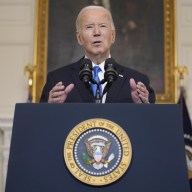By Crispian Balmer
ROME (Reuters) – The anti-establishment 5-Star Movement emerged as Italy’s predominant political force at March elections, allowing it to enter government for the first time in its short history and take many top ministerial jobs.
Five months later, it is discovering that governing is considerably more difficult than being in opposition.
While its coalition partner the League has overtaken it in opinion polls, driven forward by its media-savvy leader Matteo Salvini, 5-Star has seen its own support slip.
Led by Luigi Di Maio, the party has already had to jettison some campaign pledges, has seen high-profile ministers make gaffe-prone cabinet debuts and has struggled to corral its disparate bloc of parliamentarians.
The worries facing 5-Star, coupled with Salvini’s surging popularity, are certain to embolden the far-right League as it pursues its anti-immigrant, Italy-first agenda, confident that if the coalition fell apart it would triumph in a snap election.
The setbacks afflicting 5-Star show the problems facing unconventional, populist parties that are sprouting up across Europe as they evolve from raucous protest movements into mature rulers.
But the initial reversals are also likely to harden 5-Star resolve in the government’s showdown with the European Union over next year’s budget as it seeks to show its voters that it has not lost its radical zeal.
“Salvini has the wind in his sails and the 5-Star doesn’t any more,” said Sergio Fabbrini, head of the political science department at Rome’s LUISS university.
“The 5-Star based its electoral success on promises that are proving very hard to fulfil and you can see that it is struggling to stay true to itself,” he added.
Di Maio, 32, denies his party is in any difficulty and insists it has scored early successes, including curbing parliamentary privileges and bolstering workers’ rights.
He has accused the press of being prejudiced against 5-Star, denouncing journalists as “foul jackals”, and alleging that newspapers are intent on stirring trouble between himself and his fellow deputy prime minister, Salvini.
“This government enjoys a great consensus in the country and the other parties are trailing far behind us,” he told a group of foreign journalists earlier this month.
MEDIA MASTERY
But the polls are more comforting for Salvini than Di Maio.
While the League won 17 percent of the vote in March against 32 percent for 5-Star, a Nov. 19 survey put Salvini’s party on 32.7 percent against 26.4 percent for 5-Star – a reverse that pollsters SWG said should sound a “red alarm” for Di Maio.
Daniela Aiuto, a European parliamentarian who last month quit 5-Star after a disagreement with its leadership, says Salvini’s success is based on his mastery of social media as he pursues his hardline crackdown on immigration.
“Luigi (Di Maio) has ability, but the comparison with Salvini is sadly one-sided,” she told Reuters. “What Luigi says might be important, but what Salvini says makes headlines.”
Insiders say the two coalition leaders get on relatively well, speaking to each other every day and regularly exchanging messages via WhatsApp. But relationships between the two parties’ ministers, lawmakers and experts are much more fraught.
While the League has years of experience of government, at a national and local level, 5-Star was only formed in 2009 and has much less administrative know-how. League lawmakers such as Igor Iezzi say this inexperience can be seen in parliament.
“They must learn to work in a coalition. We are not on Facebook, where you read the posts and then change your mind,” Iezzi told Reuters, complaining that 5-Star counterparts were chopping and changing their ideas on amendments.
“If you work 10 days on an amendment, you cannot then go back on it … You need to grow up a bit,” he said.
DISCIPLINE
Salvini has found it easier to marshal his parliamentary forces than Di Maio, who is trying to enforce order by threatening to expel anyone who votes down coalition proposals.
One such dissenter is Gregorio De Falco, a former coastguard commander viewed as a hero in Italy for his role in rescuing survivors from the stricken Costa Concordia cruise ship in 2012.
His decision to stand as a 5-Star candidate in the March ballot was seen as a coup for the party, but he has now voted against the government three times in less than a month, most recently in opposition to a proposed amnesty on illegal building on the earthquake-hit island of Ischia.
“5-Star was born as an environmental group and we cannot forget this now we are in government,” De Falco told Reuters.
The party has already disappointed its environmentalist wing by reneging on a campaign pledge to halt the construction of the TAP gas pipeline project in the Puglia region.
It explained the U-turn by saying Italy could have been hit by fines of 20 billion euro ($23 billion) if it had killed the project and denied knowing this before taking office.
Likewise, it infuriated some supporters by letting steel giant ArcelorMittal buy Italy’s troubled Ilva steelmaker rather than follow through on promises to shut down the firm’s heavily polluting Puglia furnaces.
These decisions dictated by realpolitik have put 5-Star on the defensive and made it determined not to cede ground in other battles – most notably over its flagship policy, the so-called “citizen’s wage”, an income support plan for the poor.
The proposal helped 5-Star win up to 50 percent of the vote in the underdeveloped south and Di Maio insists it must be introduced it next year at a cost of around 10 billion euros.
The League, which draws much support from the wealthy north and is ideologically opposed to major welfare handouts, has agreed to the plan in principle, but warns its implementation will be “complicated”.
“This is creating permanent tensions with the League, but it would be a disaster for 5-Star if the plan fails so they will do everything possible to prevent that happening.” said Luiss University professor Fabbrini.
When it comes to trying to impose its will on its coalition partner, 5-Star has one important handicap.
In a country that has seen some 65 governments since World War Two, coalition parties have regularly threatened to walk out of administrations if they don’t get what they want. But such threats from the 5-Star would ring hollow.
Under party rules, its lawmakers can only serve two mandates, which means Di Maio and most top party officials will not be allowed to stand at the next election. Analysts believe this means they will do everything they can to cling to office.
“Di Maio has every interest in keeping the government going, even though it cannot give him everything he needs. This puts him at a distinct disadvantage to Salvini,” said Fabbrini.
(Additional reporting by Angelo Amante; Editing by Giles Elgood)


















